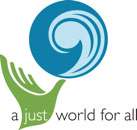Refugee Sunday Sermon and Liturgy Notes

Refugee Justice Sunday, UCC
June 17, 2018
Mark 4: 26-32
Abundance, not Fear
Mark 4: 26-32 considers the nature of the Kingdom of God. This realm of God is concrete, and it is beyond logic. Imagination and parables are required to tell the story and experience this kin-dom of God.
This the second of the sowing seeds parables in Mark 4. Mark 4: 1-9 has the protagonist as the sower. Is this Jesus’ self-identification in the parable? Perhaps the hearers and the message are the seed. The contexts in which these seeds land are varied and contribute to different outcomes. In the end, the fertile soil, the work of the sower and the seed contribute to an abundant yield of grain.
Here, a few verses later, in verse 26, the outcome again is bountiful grain, but here, the main actor is the seed. Here, the seed is the realm of God, the nature of God’s presence and the community that it creates. The sower is still present and actively part of the unfolding drama, but the story is clear that the sower is not solely responsible for the result. In the sower’s life, this action is part of a cycle of everyday life. It seems almost like the rhythm of breathing or of a beating heart. Sowing this seed is not something done in addition to everyday life, or only for a season. It IS everyday life.
In this parable, the earth’s role is also active. It is the context and actions in which the seed grows. The seed becomes its true self as it interacts with the earth and becomes more than it was at the outset. That phrase “the whole is more than the sum of its parts” applies to this telling of the realm of God. The parable is oddly specific about the stages of the seed’s growth, commenting specifically on the progression of growth: the stalk, the head, the full grain in the head. One can almost touch and taste the unfolding of this bounty. As the sower re-enters the parable with sickle in hand, the harvest is ready. There is enough for all.
The second parable in this collection that imagines the kingdom of God is one of contrasts. A tiny seed becomes a giant shrub. Open fields become mustard shrubs become large branches full of nesting birds. In this story, we don’t even find mention of an outside sower. The parable is all about transformation of the seed and the outcome of abundance and refuge. This is the nature of God’s relationships in the world.
Interacting with the Text
On this Sunday before the world’s annual observance of World Refugee Day (June 20), these parables speak to and through faith toward a vision of refuge and abundance. Looking at these images through the eyes of accompanying refugees, we see those nesting birds of the air who find refuge in the large branches of what once was a tiny seed. We see the abundance of grain transformed from seed to stalk to full head of grain available for the harvest.
For refugees and other people who have been forcibly displaced, reality today likely feels like that tiny mustard seed or that barren field of unsown grain. With more forcibly displaced people in the world today than ever before in recorded history, the need grows exponentially. At the same time that more people are forced to move, less movement is allowed. Violence multiplies. National borders close. Seas rise to cover once-habitable land. Fear escalates.
Rev. Tafue Lusama, Secretary-General of the Christian Church of Tuvalu, ( a long-time Global Ministries’ partner church) speaks of people forced from their homes on the Pacific island nation. Climate Change and the World’s Uprooted People.
Refugees from Syria continue to flee. Jade Siriani spoke at the last UCC National Youth Event of his displacement. Fleeing War and Remembering Home.
The United States is engaged in a systematic dismantling of our refugee resettlement connections and opportunities to offer asylum for those fleeing war and persecution. Borders are closed and militarized. The maximum number of refugees allowed into the USA has been more than cut in half since 2016. In 2018 only half of that maximum number will actually be resettled because of other restrictions based on fear. Tearing apart the refugee resettlement system
And into these scenarios, break parables of sowers, seeds, earth and bounty. These are parables that imagine God’s kingdom into being. They are visions of what God intends and makes possible. The birds of the air do have a place to nest and take refuge and thrive. The stalk does burst into a head full of grain for the harvest. Advocates are actively raising a voice for change. Communities are organizing to provide hospitality and bring people together. Coalitions are working to vision and implement a system for refugee resettlement that can thrive now and in the future. You and I are empowered to act out of the vision of God’s presence and action that is abundance and refuge, not fear and exclusion. UCC Refugee Ministries. This is who we are and who we can be. Thanks be to God.
Notes for Refugee Justice Sunday were written by the Rev. Dr. Mary Schaller Blaufuss, Team Leader for Humanitarian and Development Ministries of Wider Church Ministries.
Copyright © 2018 United Church of Christ, 700 Prospect Avenue, Cleveland, OH 44115-1100. Permission granted to reproduce or adapt this material for use in services of worship or church education. All publishing rights reserved.
